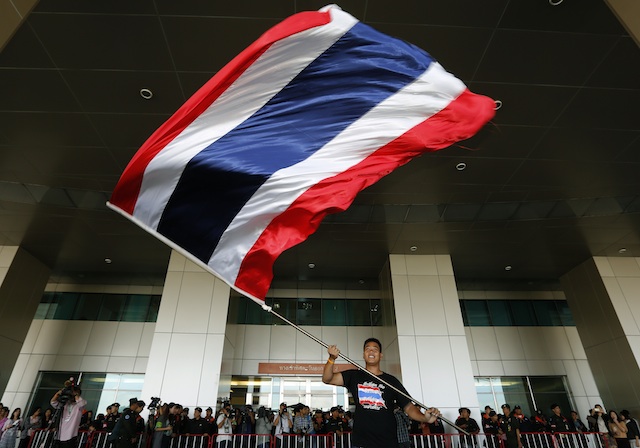SUMMARY
This is AI generated summarization, which may have errors. For context, always refer to the full article.

BANGKOK, Thailand – Thailand’s political crisis is poised to enter a crucial new phase this weekend as the main opposition mulls a possible boycott of snap polls and protesters ramp up rallies aimed at toppling the government.
Bangkok has been rocked by weeks of street marches, with demonstrators invading government buildings and gathering in their thousands in the latest eruption of political unrest in the turbulent nation.
The protests are calling for democracy to be suspended and want to rid the country of premier Yingluck Shinawatra and the influence of her brother Thaksin – an ousted billionaire ex-premier who is despised by a coalition of the southern Thai poor, Bangkok middle classes and elite.
They have been joined by the opposition Democrat Party, which resigned en masse from parliament to join rallies.
But analysts say Yingluck’s announcement of February 2 elections has thrust the Democrats onto the horns of a dilemma.
If they choose to boycott the poll, Thailand’s oldest party risks being excluded from the political process, while a decision to join will dismay protesters who have vowed to disrupt the vote.
“They are damned if they do, damned if they don’t,” said Paul Chambers director of research at the Institute of South East Asian Affairs at Chiang Mai University.
A Democrat boycott in 2006 helped create the political uncertainty which heralded the military coup that ousted Thaksin.
But Chambers said new election rules have upped the stakes for the opposition, meaning they risk losing their electoral bases.
The party “would be doomed to the wilderness if they boycott and Puea Thai (ruling party) picks up the pro-Democrat constituencies,” he said.
Democrat leader Abhisit Vejjajiva, a British-born Oxford educated former premier, has said his party will meet to decide its stance on Saturday, December 21, a day ahead of a planned major rally by the protesters, who are led by his firebrand former deputy Suthep Thaugsuban.
Experts say the protests are supported by powerful behind-the-scenes forces, in a country where the royalist army and establishment have acted as power brokers in the country, which has seen nearly 20 successful or attempted coups in the last 80 years.
Suthep, who has given caustic nightly speeches against the Shinawatras, has dismissed the election, saying it will install another Thaksin-aligned government.
Earlier rallies have drawn at least 150,000 supporters at their peak to the streets, in some of the largest demonstrations for years in the politically-divided kingdom.
Opposition split over poll boycott
“If the Democrats decide to participate, then Suthep and his movement may have to focus on pushing for a postponement of the polls publicly and perhaps for a coup privately,” said Michael Montesano at the Institute of Southeast Asian Studies in Singapore.
The Democrats appear split over whether to campaign in the upcoming poll or stick with their street allies.
Observers say the army is unlikely to intervene directly this time, but other establishment forces could yet scupper the poll.
Thailand’s National Anti-Corruption Commission is mulling whether to charge hundreds of ruling Puea Thai party lawmakers over an attempt to remodel the make-up of Thailand’s Senate.
Corruption is a central theme in the arguments over Thaksin, the billionaire telecoms tycoon-turned-politician who is a hero to many rural communities in the north and northeast.
His policies include nearly-free healthcare and a generous rice subsidy and have helped him and his allies win every election since 2001.
But Thaksin, who lives abroad to avoid a jail term for abuse of power, is loathed by the Bangkok middle classes and elites, who accuse him of using his electoral majority to attempt to consolidate power.
Suthep’s People’s Democratic Reform Committee has relied on allegations that the former leader is involved in corruption and vote buying as a justification for its suggestion that an unelected “people’s council” institute sweeping reforms.
The protesters want these changes in place before new elections in a year or more.
But Suthep is “no stranger” to allegations of corruption, said Sophie Boisseau du Rocher of the Asia Centre in Paris.
A land scandal in 1995 saw him mired in a controversy that precipitated the fall of then-Democrat government.
The 64-year-old “is not a conviction politician who engages in the political battle of ideas and values”, she said.
Suthep currently faces an arrest warrant for insurrection linked to the ongoing political crisis.
He is also due to be indicted on January 8 on murder charges linked to his role in a deadly crackdown on pro-Thaksin “Red Shirt” protests in 2010 when he was deputy prime minister under Abhisit.
“This is precisely where the poverty of the Thai political scene is seen in broad daylight,” added du Rocher. – Rappler.com
Add a comment
How does this make you feel?
There are no comments yet. Add your comment to start the conversation.